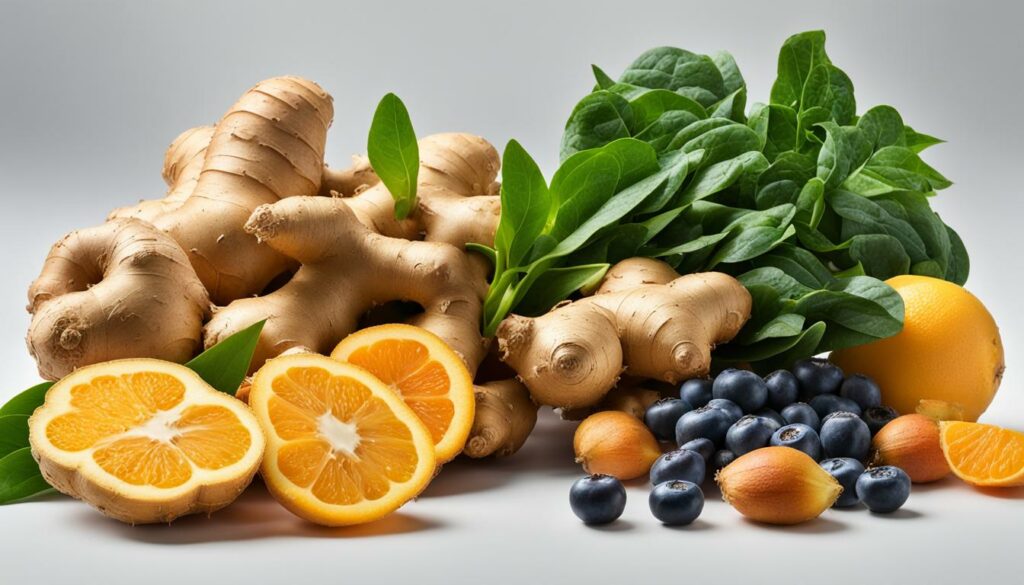Ginger is a versatile ingredient that goes beyond adding flavor to your recipes. In fact, it offers a wide range of health benefits that can improve your overall well-being. The main active compound in ginger, gingerol, has potent medicinal properties that have been studied for their therapeutic effects.
Ginger is known for its positive impact on digestion. It promotes gastrointestinal motility, allowing food to move more efficiently through the digestive system. This can help reduce bloating, prevent constipation, and support overall digestive health.
Additionally, ginger has been used for generations to relieve nausea, including symptoms caused by chemotherapy and pregnancy.
Not only does ginger aid in digestion and relieve nausea, but it also contains antioxidants that help protect against cell damage. These antioxidants can help prevent wear and tear on cells, promoting overall cellular health.
Ginger also shows potential as an anti-inflammatory agent, which may have positive effects on conditions such as rheumatoid arthritis and respiratory inflammation.
There are various ways to consume ginger, with ginger tea being a popular choice. Ginger tea offers soothing and warming properties, making it enjoyable year-round. You can also incorporate ginger into your cooking, using fresh ginger root, ginger paste, or ginger powder in both sweet and savory dishes.
Discover the health benefits of ginger and how it can contribute to your overall well-being.
Key Takeaways:
- Ginger offers a wide range of health benefits due to its active compound, gingerol.
- It aids digestion by promoting gastrointestinal motility and provides relief from nausea.
- Ginger contains antioxidants that protect against cell damage.
- It shows potential as an anti-inflammatory agent that may help with conditions like rheumatoid arthritis.
- Ginger can be consumed as ginger tea or incorporated into various recipes.
Ginger’s impact on digestion and nausea relief
Ginger is not only a flavorful spice but also plays a crucial role in promoting healthy digestion and providing relief from nausea. Let’s explore how ginger can benefit your digestive system and help alleviate discomfort.
Promoting Gastrointestinal Motility
Ginger has been found to promote gastrointestinal motility, which refers to the movement of food through the digestive system. This means that ginger can help food move more efficiently, reducing the amount of time it spends in the gut.
By improving gastrointestinal motility, ginger can aid in preventing bloating and reducing the risk of constipation.

Relief from Nausea
Ginger has a long history of being used as a natural remedy for nausea. It has proven particularly effective in relieving nausea associated with chemotherapy and pregnancy.
The active compound in ginger, gingerol, has anti-inflammatory properties that may play a role in reducing nausea and vomiting. This makes ginger a safe and natural option for managing these symptoms.
Reducing Bloating and Gas
Ginger’s ability to cut down on fermentation in the intestines makes it beneficial for reducing bloating and gas. By regulating the digestive process, ginger helps prevent the buildup of excess gas, which can cause discomfort and bloating.
“Ginger has been used for centuries to improve digestion and ease nausea. Its natural properties make it an effective and safe remedy for various digestive issues.” – Dr. Amanda Jackson
How to Incorporate Ginger into Your Diet
There are various ways to consume ginger and enjoy its digestive benefits. One popular option is to make ginger tea by steeping slices of fresh ginger in boiling water for at least 10 minutes.
You can also enhance the flavor of ginger tea by adding a squeeze of lemon or a drizzle of honey. Commercial ginger tea bags are available for convenience, but using fresh ginger provides stronger health benefits.
In addition to tea, ginger can be incorporated into your cooking. Freshly grated or minced ginger root, ginger paste, and ginger powder are versatile options that add a burst of flavor to both sweet and savory dishes.
| Ginger Consumption Options | Benefits |
|---|---|
| Ginger Tea | Offers soothing properties and aids in digestion |
| Fresh Ginger in Cooking | Enhances flavor and provides digestive benefits |
| Ginger Paste | Convenient option for adding ginger to dishes |
| Ginger Powder | Easy-to-use and versatile option for various recipes |
Adding ginger to your diet is a flavorful way to improve digestion, reduce nausea, and alleviate bloating and gas. Start incorporating this versatile root into your meals and experience the digestive benefits it has to offer.
Ginger’s Antioxidant Properties and Potential Anti-Inflammatory Effects
Ginger is not only prized for its culinary uses but also for its impressive health benefits. One of the key properties of ginger is its antioxidant content, which plays a crucial role in protecting our cells from damage caused by harmful free radicals.
These antioxidants work by neutralizing the free radicals, preventing them from causing oxidative stress and cellular damage.
Moreover, ginger contains over 400 natural compounds, some of which have displayed anti-inflammatory properties.
While more research is still needed to fully understand the mechanisms behind ginger’s anti-inflammatory effects, early studies have shown promising results. Ginger may have the potential to help manage various inflammatory conditions, such as rheumatoid arthritis and respiratory inflammation.
“Ginger’s antioxidant properties and anti-inflammatory effects make it a valuable ingredient for promoting overall well-being.”
The Power of Antioxidants in Ginger
The antioxidants found in ginger, such as gingerol, zingerone, and shogaols, help protect our cells from oxidative damage. These compounds scavenge free radicals, preventing them from causing cellular harm.
By incorporating ginger into your diet, you can bolster your body’s defense against oxidative stress and promote optimal cellular health.

Ginger’s Potential as an Anti-Inflammatory Agent
Chronic inflammation is a common underlying factor in many diseases, including arthritis, cardiovascular conditions, and certain types of cancer. Emerging research suggests that ginger’s anti-inflammatory properties may help mitigate the inflammatory response and contribute to improved health outcomes.
While the exact mechanisms by which ginger exerts its anti-inflammatory effects are still being explored, studies have indicated that ginger’s bioactive compounds can hinder the production of pro-inflammatory molecules, such as cytokines and prostaglandins.
By modulating the inflammatory response, ginger may provide relief for individuals with inflammatory conditions and support the body’s natural healing processes.
Supporting Your Body’s Natural Inflammatory Response
While more research is needed to fully understand the therapeutic potential of ginger as an anti-inflammatory agent, incorporating this versatile root into your daily diet can be a proactive step towards supporting your body’s natural inflammatory response.
By adding ginger to your meals and enjoying it as a tea, you can harness its potential benefits and enhance your overall well-being.
Ginger Tea Benefits and Ways to Consume Ginger
Ginger tea offers numerous health benefits and is a popular way to consume ginger. Not only does it provide a warm and soothing experience, but it also carries a range of medicinal properties that can enhance your well-being.
To make ginger tea, start by slicing fresh ginger into thin pieces. Then, bring a pot of water to a boil and add the ginger slices. Let the mixture simmer for at least 10 minutes to ensure that the ginger’s health-promoting compounds are extracted thoroughly.
You can adjust the strength of the tea by increasing or decreasing the amount of ginger or steeping time. Remember, the longer you steep, the stronger the flavor and potential benefits.
For added flavor, you can enhance your ginger tea with a squeeze of lemon or lime juice and a teaspoon of honey. These additions not only complement the natural warmth of ginger but also provide additional health benefits.
Lemon and lime juice are high in vitamin C, which supports a healthy immune system, while honey offers antimicrobial properties and soothes sore throats.
If convenience is a priority, you can also opt for commercial ginger tea bags. However, it’s important to note that fresh ginger offers stronger health benefits due to its higher concentration of active compounds.
Ginger is not limited to a warm cup of tea; you can incorporate this versatile root into various recipes for both sweet and savory dishes.
Whether you prefer the zesty kick of freshly grated or minced ginger root, the convenience of ginger paste, or the subtle flavor of ginger powder, there are countless ways to enjoy ginger in your culinary creations.
Here are a few ideas for using ginger in your cooking:
- Add freshly grated or minced ginger to stir-fries and sautés for a vibrant and aromatic twist.
- Blend ginger paste into salad dressings and marinades to infuse them with a unique flavor.
- Incorporate ginger powder into baked goods like cookies, cakes, and bread for a subtly spicy kick.
- Mix ginger paste or powder into smoothies or juices for an extra boost of flavor and potential health benefits.
Remember to adjust the amount of ginger to suit your taste preferences and recipe requirements. Start with small amounts and gradually increase if desired, as ginger can have a strong and distinct flavor.
Benefits of Different Forms of Ginger for Cooking
| Ginger Form | Benefits |
|---|---|
| Freshly grated or minced ginger root | – Intense flavor – Provides a crispy texture in dishes – Offers higher concentration of active compounds |
| Ginger paste | – Convenient and time-saving – Blends well into sauces, dressings, and marinades – Offers moderate ginger flavor |
| Ginger powder | – Subtle flavor and aroma – Easy to measure and use in recipes – Suitable for baked goods and beverages |
Choose the form of ginger that best suits your cooking needs and flavor preferences. Experiment with different forms to discover the culinary possibilities and find your favorite way to incorporate ginger into your dishes.
Conclusion
Ginger is not just a spice; it’s a powerhouse of health benefits that can greatly contribute to your overall well-being. The active compound in ginger, gingerol, offers numerous advantages for your body and provides therapeutic support.
By promoting digestion, relieving nausea, and reducing bloating and gas, ginger can support a healthy gastrointestinal system. Additionally, ginger’s antioxidant properties help protect your cells from damage, while its potential anti-inflammatory effects may have positive impacts on conditions like rheumatoid arthritis.
Whether you choose to enjoy ginger in the form of a warm and soothing ginger tea or incorporate it into your cooking, it’s a versatile ingredient that enhances both flavor and health benefits.
Ginger tea, made by steeping fresh ginger in boiling water, is a popular and enjoyable way to consume ginger. You can customize it with additions like lemon, lime, or honey for added taste. Similarly, fresh ginger can be grated or minced and used in various recipes, adding a distinctive flavor to both sweet and savory dishes.
Adding ginger to your diet is a simple and effective way to harness its health benefits and improve your overall well-being.
So why not embrace the natural healing powers of ginger? Start incorporating this fragrant root into your meals and experience the positive effects it can have on your body.
FAQ
What are the health benefits of ginger?
Ginger offers a wide range of health benefits, including aiding in digestion, providing relief from nausea, protecting against cell damage with its antioxidants, and potentially reducing inflammation.
How does ginger impact digestion and provide nausea relief?
Ginger promotes gastrointestinal motility, which helps food move through the digestive system more efficiently. It can reduce bloating and the risk of constipation. Ginger is also known for its ability to relieve nausea, especially associated with chemotherapy and pregnancy.
What are ginger’s antioxidant properties and potential anti-inflammatory effects?
Ginger contains antioxidants that protect against cell damage caused by free radicals. It may also have anti-inflammatory effects due to its natural compounds. While more research is needed, ginger’s anti-inflammatory effects may benefit conditions like rheumatoid arthritis and respiratory inflammation.
How can ginger be consumed and what are the benefits of ginger tea?
Ginger can be consumed in various forms, including ginger tea. Steeping slices of fresh ginger in boiling water creates soothing and warming ginger tea. It can also be enjoyed with additions like lemon, lime, or honey.
Ginger tea offers numerous health benefits and is a popular way to consume ginger. Fresh ginger provides stronger health benefits compared to commercial ginger tea bags.
What are the health benefits of ginger for overall well-being?
Ginger has a myriad of health benefits, from aiding digestion and reducing nausea to its antioxidant properties and potential anti-inflammatory effects. Adding ginger to your diet can greatly contribute to your overall well-being and enhance the flavor and health benefits of your meals.




